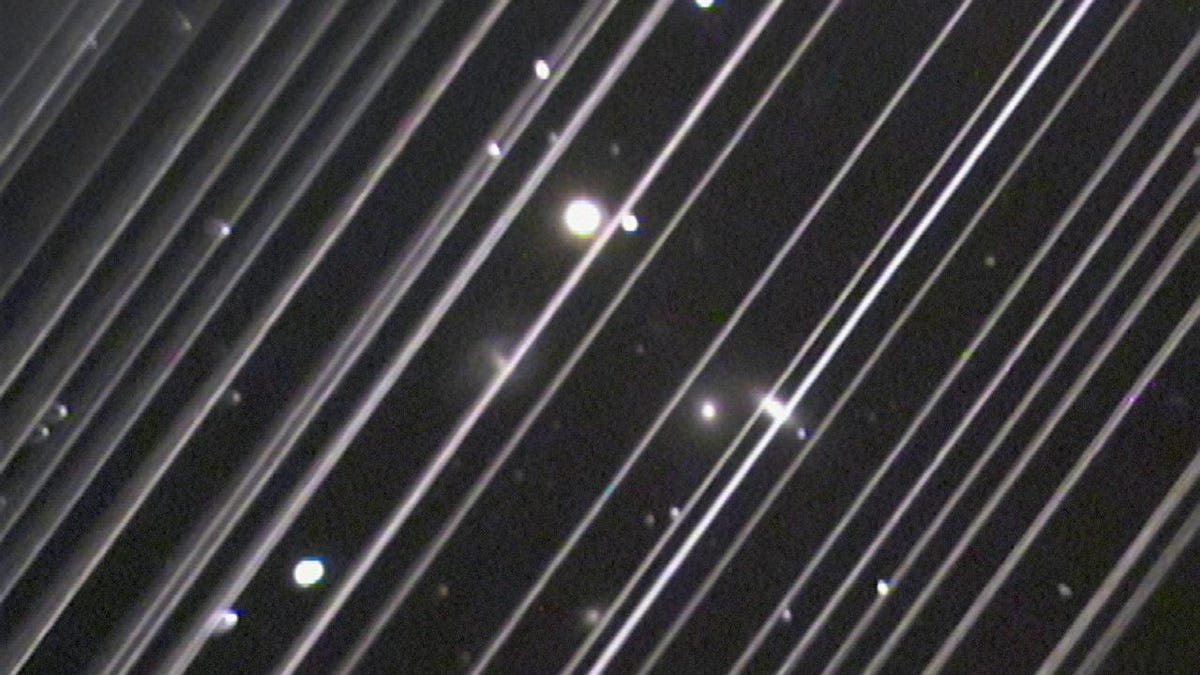SpaceX Starlink satellites have astronomers amplifying the cosmic alarm
Elon Musk's plan to bring broadband to rural parts of the globe could come with unintended side effects, the scientists say.

This image of a distant galaxy group from Arizona's Lowell Observatory is marred by diagonal lines from the trails of Starlink satellites shortly after their launch in May.
The world's largest organization of professional astronomers is sounding the galactic alarm over Elon Musk's plan to send a swarm of SpaceX satellites into low-Earth orbit.
Almost immediately after a Falcon 9 rocket released the first batch of the company's Starlink broadband internet satellites last month, stargazers were dismayed by just how bright and noticeable the train of orbiting routers is in the night sky. Now the concern has moved from chatter on social media to a more formal call for new government regulation from the International Astronomical Union.
In a statement Monday, the IAU said large satellite constellations like Starlink could have unforeseen consequences for advancing our understanding of the universe and the protection of nocturnal wildlife. "We do not yet understand the impact of thousands of these visible satellites scattered across the night sky and despite their good intentions, these satellite constellations may threaten both," the statement reads.
The IAU shared the above image, which shows bars of light from Starlink satellite trails in the field of view captured by Arizona's Lowell Observatory. The trails obscure the view of galaxy group NGC 5353/4.
"Although this image serves as an illustration of the impact of reflections from satellite constellations, please note that the density of these satellites is significantly higher in the days after launch," the organization explained.
A SpaceX spokesperson added via email that "the observability of the Starlink satellites is dramatically reduced as they raise orbit to greater distance and orient themselves with the phased array antennas toward Earth and their solar arrays behind the body of the satellite."
Nonetheless, should SpaceX deploy all the Starlink satellites it is permitted for, it would more than double the amount of satellites currently orbiting Earth, with some being granted permission to orbit at even lower orbits than originally conceived.
The IAU, which represents over 13,000 astronomers, called for satellite constellation operators and astronomers to work together more closely and urged "appropriate agencies to devise a regulatory framework to mitigate or eliminate the detrimental impacts on scientific exploration as soon as practical."
For its part, SpaceX has already been coordinating with the US National Science Foundation, which oversees the National Radio Astronomy Observatory.
"After working closely with SpaceX, NSF has finalized a coordination agreement to ensure the company's Starlink satellite network plans will meet international radio astronomy protection standards, limiting interference in this radio astronomy band," the NSF said in a statement Tuesday.
Elon Musk also hinted at a possible long-term solution on Twitter: "We need to move telelscopes (sic) to orbit anyway."
There are already 4900 satellites in orbit, which people notice ~0% of the time. Starlink won’t be seen by anyone unless looking very carefully & will have ~0% impact on advancements in astronomy. We need to move telelscopes to orbit anyway. Atmospheric attenuation is terrible. pic.twitter.com/OuWYfNmw0D
— Elon Musk (@elonmusk) May 27, 2019
Originally published June 4.

